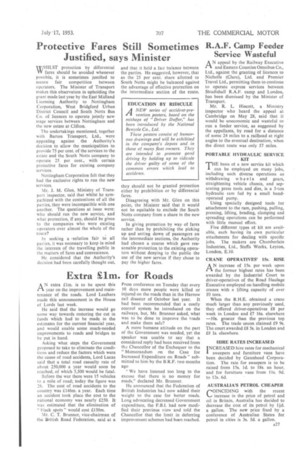Extra Elm .for Roads
Page 29

If you've noticed an error in this article please click here to report it so we can fix it.
AN extra Elm. is to be spent this year on the improvement and maintenance of the roads. Lord Leathers made this announcement in the House of Lords last week.
He said thaf the increase would go some way towards restoring the cut in funds which had to be made in the estimates for the current financial year, and would enable some much-needed improvements to roads and bridges to be put in hand.
Asking what steps the Government proposed to take to eliminate the conditions and reduce the factors which were the cause of road accidents, Lord Lucas said that a total road casualty rate of about 250,000 a year would soon be reached, of which 5,500 would be fatal.
Before the war there were 15 vehicles to a mile of road; today the figure was 26. The cost of road accidents to the country was £146m. a year. Each time an accident took place the cost to the national economy was nearly £250. It was estimated that the elimination of " black spots" would cost £150m.
Mr. C. T. Brunner, vice-chairman of the British Road Federation, said at a Press conference on Tuesday that every 10 days more people were killed or injured on the roads than in the Harrow rail disaster of October last year. It had been recommended that a costly control system be introduced on the railways, but, Mr. Brunner asked, what was to be done to improve the roads and make them safe?
A more humane attitude on the part of the Government was needed, yet the speaker was unable to" say that a considered reply had been received from the Chancellor of the Exchequer to the "Memorandum on the Case for Increased Expenditure on Roads" submitted to him by the B.R.F. two months ago "We have listened too long to the excuse that there is no money for roads," declared Mr. Brunner.
He announced that the Federation of British Industries had now added their weight to the case for better roads. Long advocating decreased Government expenditure, the F.B.I. had now modified their previous view and told the Chancellor that the limit in deferring improvement schemes had been reached.




















































































